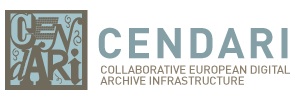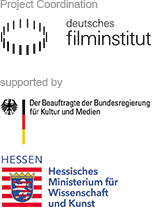Related initiatives and projects
Europeana is a partnership of European cultural heritage associations that have joined forces to bring together the digitised content of Europe’s galleries, libraries, museums, archives and audiovisual collections. Currently the Europeana online portal gives integrated access to over 20 million books, films, paintings, museum objects and archival documents from some 1700 content providers. The content is drawn from every European member state and the interface is in 27 European languages. Europeana has a multitude of so-called aggregator projects that collect metadata from a group of data providers and transmit them to Europeana. Aggregators, like EFG1914 is one, also support the data providers with administration, operations and training. A list of current Europeana aggregators and projects can be found here. The Europeana office is loacted in The Hague, Netherlands and receives its main funding from the European Commission.
Currently two other projects from the Europeana Group are dealing with the theme of the Great War:
Europeana 1914-1918 is based on an initiative at the University of Oxford where people across Britain were asked to bring family letters, photographs and keepsakes from the War to be digitised. The success of the idea – which became the Great War Archive – has encouraged Europeana, Europe’s digital archive, library and museum, to bring other national institutions across Europe into an alliance with Oxford University. The collaboration brings European stories online alongside their British, German, Slovenian, Luxembourgian, Irish, etc. counterparts in a World War One stories collection available via the Europeana1914-1918 online archive. At the website, anyone can add their objects to the collection together with their stories. The objects that are submitted will be checked by the project team and then also made available through Europeana. Since January 2014, Europeana1914-1918.eu also gives access to the materials digitised within the EFG1914 project and the Europeana Collections 1914-1918 project.
Europeana Collections 1914-1918 will create by 2014 – the centenary of the outbreak of the First World War – a substantial digital collection of material from national library collections of ten libraries in eight countries that found themselves on different sides of the historic conflict. The project consortium will make available to Europeana 425.000 especially relevant items that will be selected with help from specialists and target user groups according to agreed quality criteria. They will span the full range of national library collections including books, newspapers, trench journals, maps, children’s literature, posters, pamphlets, propaganda leaflets, medals and coins. The digital collection will go far beyond any existing digital collection on the topic in terms of size, quality and diversity and make Europeana the first stop for quality content on the “Great War”. The project started on 1 March 2011 and runs for three years.
The international joint research project “1914-1918 online. International Encyclopedia of the First World War” is developing an open access, English-language virtual encyclopedia about the First World War. The aim of the project is to provide a globally oriented historical overview of WWI, based on a collaborative research network. Around 40 renowned experts from 14 countries are participating in this international project which is coordinated by Friedrich-Meinecke-Institute and the Center for Digital Systems CeDiS, Freie Universität Berlin. The project started in 2011 and will run for 3 years. It is funded by Deutsche Forschungsgemeinschaft (DFG) under the programme “Scientific Library and Information Systems”.
 The primary goal of CENDARI (Collaborative European Digital Archive Infrastructure) is to create a widely applicable research infrastructure for medieval and modern history. One pilot area of research is World War One. CENDARI will provide and facilitate access to unique archival resources, from personal diaries to propaganda leaflets dropped over Germany in 1917, as well as a huge flexibility in the organisation and visualization of these materials, prompting new research methods and answers to previously unimaginable questions. CENDARI is an EU funded project led by the Trinity College Dublin, in partnership with 14 European institutions. It started in January 2011 and will last for 4 years.
The primary goal of CENDARI (Collaborative European Digital Archive Infrastructure) is to create a widely applicable research infrastructure for medieval and modern history. One pilot area of research is World War One. CENDARI will provide and facilitate access to unique archival resources, from personal diaries to propaganda leaflets dropped over Germany in 1917, as well as a huge flexibility in the organisation and visualization of these materials, prompting new research methods and answers to previously unimaginable questions. CENDARI is an EU funded project led by the Trinity College Dublin, in partnership with 14 European institutions. It started in January 2011 and will last for 4 years.
More WWI related projects, portals and blogs
UK
The First World War Centenary Partnership is a network of over 850 local, regional, national and international cultural and educational organisations led by IWM (Imperial War Museums). A global Programme of cultural events and activities, and digital platforms which will enable millions of people across the world to discover more about life in the First World War.
The website offers a substantial collection of learning resources available for reuse. A rich variety of materials, including expert articles, audio and video lectures, downloadable images, interactive maps and ebooks are available under a set of cross-disciplinary themes that seek to reappraise the War in its cultural, social, geographical and historical contexts. Many of these resources have been specially created by the University of Oxford and partner academics for this website. All resources are released under a Creative Commons license.
JISC (Joint Information Systems Committee) is a UK based company which encourages the adoption and usage of digital technologies within UK teaching, learning and research. A large body of work to support WW1 study has been undertaken by JISC to support teaching, learning and research around WW1 through a range of digitisation and crowd-sourcing projects. An example of this work is The Great War Archive which digitised items contributed by the general public related to ‘someone’s experience of the First World War, either abroad or at home’. This has given rise to similar projects in participating countries e.g. in Germany, ‘Erster Weltkrieg in Alltagsdokumenten’.
Italy
Belgium
The project has been set up by the province of West-flanders and Westtoer. By 2014, the website will list important commemoration sites (museums, cemeteries) of region and publish WWI related exhibitions, tours and other events.
France
Offical portal of the commemoration prgrogramme set up by the French Government in 2012. The website provides information about cultural, scientific, educational and touristic activities related to First World War in France and abroad. “Trésor d’archives” offers a long list of archival ressources.
France / Germany
The German Historical Institute in Paris maintains this blog to inform about events and activities of its research programme “First World War” and “Politics and Cultural History of the Prewar Period 1900-1914“. You also find information about academic research programmes on WWI as well as other initiatives related to the WWI centenary.
Research Databases on WWI
Education
Classroom4.eu started an Essay Contest for European students from the age of 16 to 19. Pupils across Europe are invited to do researches on the history of their city in 1914 to tell the other (hi)story of this year. Deadline for submission is 31 July 2014. to learn more about the essay topics please go to http://classroom4.eu/contest-2014/





